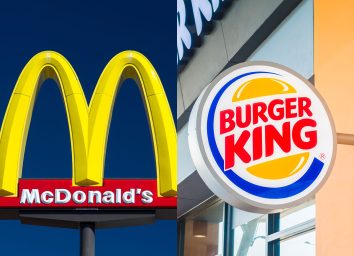If You Live Near Fast-Food Restaurants, You May Be More at Risk of This Serious Chronic Illness

It’s no surprise that eating a ton of McDonald’s isn’t going to do your health any favors, but another factor comes into play before you even make a decision to order that cheeseburger: your proximity to many different fast-food options.
New research shows that people who live in areas densely populated with fast-food restaurants are at a higher risk of developing a chronic illness plaguing and killing thousands of Americans each year: Type 2 diabetes.
RELATED: Sure Signs You May Be Getting Diabetes, According to Doctors
In the study, published in JAMA Network, researchers looked at over 4 million United States veterans living in urban, suburban, and rural areas, comparing their health data over several years to the number of fast-food restaurants in their neighborhood relative to the number of all restaurants available (one of the metrics comprising the quality of the “food environment.”) Turns out, it didn’t matter what kind of neighborhood the study participants lived in—when there were more fast-food restaurants around, the risk of developing the chronic illness was higher.
“We found that the availability of fast-food restaurants was associated with an increased risk of diabetes in all types of communities; urban, suburban, and rural,” the study’s lead author Rania Kanchi told Eat This, Not That! in an interview.
There is, however, good news, especially if you live in the suburbs or the country. Kanchi added, “We also found that the number of supermarkets was associated with a lower risk of diabetes in suburban and rural communities, but did not matter in urban communities.”
It makes sense—if you’re cooking your own meals, you’re generally going to be using whole ingredients, and you may be more thoughtful about your food choices.
“This lines up with what we know about fast-food and processed food—heavily processed food, like your typical fast-food meal, is high in sodium, refined grains (think of those white grain buns), and added sugars in the drinks, desserts, and even condiments,” Samantha Cassetty, MS, RD, nutrition and wellness expert and co-author of Sugar Shock, told Eat This, Not That! “Yet these meals are also low in healthful foods, such as fruits and veggies, whole grains, nuts, seeds, plant proteins, and seafood.”
If trying to cut these foods out of your diet feels too stressful, you can try focusing on the positives, thinking instead about the healthy foods you could be adding to your diet.
“Whenever possible, pair one fast-food item with a side salad or fresh vegetables that are rich in fiber and nutrients like potassium,” suggests Abbey Sharp, RD, CEO of Abbey’s Kitchen. “Focusing on what you can ADD to make your fast-food meals more balanced and nutritious can mean you can have your occasional cake (or burger) without significantly impacting your health.”
For more ways to be smarter about your fast-food habits, be sure to check out:
- 11 Surprisingly Healthy Fast-Food Orders, According to Experts
- The #1 Worst Order at McDonald’s, According to a Dietitian
- The #1 Healthiest Order at Chick-fil-A, According to a Nutritionist
And don’t forget to sign up for our newsletter to get the latest restaurant news delivered straight to your inbox.








